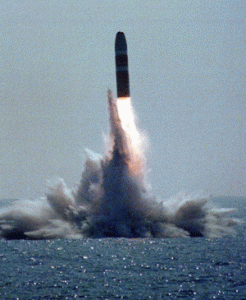 China’s anti-ship ballistic missile (ASBM) is an untested, largely notional national distraction. But now that we’ve freaked out–thanks to a ready corps of willing fear-mongering dupes–America is prepping to spend untold billions to defeat ASBMs.
China’s anti-ship ballistic missile (ASBM) is an untested, largely notional national distraction. But now that we’ve freaked out–thanks to a ready corps of willing fear-mongering dupes–America is prepping to spend untold billions to defeat ASBMs.
The threat isn’t that urgent. In fact, we should look to our own strengths and, well, feel a bit better about ourselves.
You see, America is far ahead of China in the conventional missile department. If necessary, the U.S. can convert Trident II D5’s into conventional missiles–within two years. Maybe less. Everything has been tested–The Trident II D5 just celebrated it’s 130th successful consecutive test launch, non-explosive payloads have flown, entry guidance and GPS guidance systems are ready to go, and the U.S. is tinkering with modern re-entry vehicles….All that’s left is political will to meld those pieces together into a cohesive system.
And what will the U.S. have? A reliable, precise conventional missile system with longer range, greater payload and more stealth than anything China has on the drawing board.
And regarding targets? Well, hey, while China’s ASBM-boosters might hope to target an aircraft carrier or two, we’ll have a stealthy conventional
means to eliminate China’s tiny strategic nuclear strike capability.
Some might call that a trump card. Or an assassin’s mace. But America is too busy getting into it’s usual defensive crouch to exploit that advantage. Don’t get me wrong, I think the emergence of strategic conventional ballistic missiles will be acutely destabilizing. Like reading other people’s mail, it’s distasteful and often dangerous. But with the SALT agreements, America has enough wiggle room to put conventional payloads aboard Trident II missiles.
U.S. policymakers should make a clear line in the sand, and say something along the lines of “if you carry out a functional test of an ASBM, we’ll authorize the deployment of conventional Trident II missiles.” It’s a clear, solid message from which good folks can start building an arms control agreement upon.
That said, America might do well to pause and reflect a little bit. How did a well-advertised, decade-long hunt for “prompt global strike” impact upon China’s strategic thinkers? Did it drive ASBM development? Or did China’s aspiration to field a precise ballistic missile system grow out of an community-wide impulse to merely “keep up with the Jones’s” technologically? If so, then that might (might) suggest a thing or two about the quality of China’s strategic thinking. Maybe China’s strategic thinkers are, well, human–a tad less sophisticated and awe-inspiring than U.S. fear-mongers are leading the general public to believe.
And maybe, just maybe, America’s constant pursuit of ever-more-interesting weaponry creates just as many problems as it solves.

{ 3 comments }
China’s capabilities are far beyond what we think they are. The Art of War is deception.
Totally agree–don’t want to glow in the dark either. But, that said, I can’t get around the fact that in both Europe, and, well, in Cuba, walk a pretty aggressive walk before both sides got scared enough to make some concrete arms control agreements.
The other thing is…well, with sub-launched missiles, China may not have the capability to actually see ’em coming–depends upon where the missiles were launched (god forbid that happens, but..) Also, most of China’s missiles don’t have the range to reach the US. There’s only a handful, and most of those require a pretty long warm up stage–which, by then, they’d be gone.
But I’m interested in seeing how China engages on nuclear arms control. It can’t be a pretty-exclusive US and Russian bilateral thing anymore.
One guess as to what China does if a Trident II is ever detected on their radars approaching the Chinese mainland. Hint: They aren’t going to wait until they know whether it’s carrying a conventional warhead or a nuclear warhead. Instead, they’re going to fire off every nuclear weapon in their inventory in our direction because of the possibility – nay, the probability, in their minds (the Chinese leadership not being prone to optimistic thinking) – that it’s a nuclear decapitation strike. Frankly, I prefer *NOT* glowing in the dark, thank you very much!
Comments on this entry are closed.